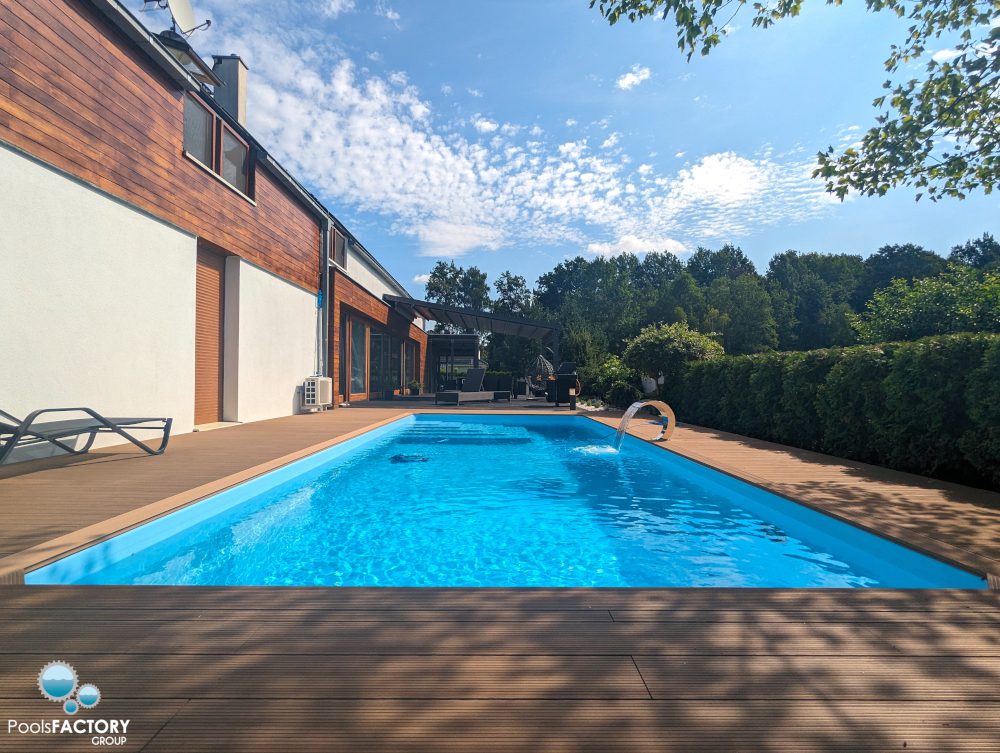YOUR CART
- 1 How Much Chlorine Do I Need to Add to a Pool of a Specific Size?
- 2 Safety in Using Chlorine for Pool Disinfection
- 3 Issues Related to Excess Chlorine in the Pool
- 4 Differences Between Pool Chlorination and Pool Water Treatment
- 4.0.1 Q&A Section
- 4.0.1.1 How much chlorine should be added to a pool with 10,000 liters of water?
- 4.0.1.2 How much chlorine is needed for 10m³?
- 4.0.1.3 How many chlorine tablets should be used for a pool with 3,000 liters of water?
- 4.0.1.4 How many chlorine tablets are recommended for a pool with 5,000 liters of water?
- 4.0.1 Q&A Section
Maintaining proper water hygiene in the pool is crucial for the health and comfort of users. One of the most popular methods for pool hygiene maintenance is the use of chlorine. In this article, we will focus on the question of how much chlorine should be added to the pool to ensure effective disinfection while maintaining safety for users.
How Much Chlorine Do I Need to Add to a Pool of a Specific Size?
A crucial factor is the size of the pool. The amount of chlorine depends on the water volume – typically, for every 10,000 liters of water, you will need about 2-3 chlorine tablets, each weighing 20g.
How to Calculate the Right Amount of Chlorine for the Pool?
Calculating the chlorine amount requires an understanding of chemical concentrations. A simple formula is used, taking into account the water volume and the recommended chlorine concentration.
Is There a Special Formula for Calculating the Required Amount of Chlorine for the Pool?
Yes, there are formulas that help calculate the precise amount of chlorine, considering factors such as pool capacity and water pH.
What Factors Should Be Considered When Determining the Amount of Chlorine for the Pool?
You should consider the pool’s size, pH level, water temperature, and pool usage (number of users).
Does Water Temperature Affect the Amount of Chlorine Needed for the Pool?
Yes, higher water temperatures can accelerate chlorine degradation, requiring an increased dosage.
What Are the Recommended Chlorine Levels in the Pool?
The recommended chlorine levels in the pool are 1-3 mg/l (ppm). Regular water testing is necessary to maintain these levels.
Are There Alternative Methods for Pool Disinfection Without Adding Chlorine?
Yes, there are alternative methods such as ozone treatment or UV light systems that reduce the need for chlorine.
What Happens If Too Much Chlorine Is Added to the Pool?
An excess of chlorine can cause skin and eye irritation and produce an unpleasant odor.
Are There Tests or Test Strips for Measuring the Chlorine Level in the Pool?
Yes, there are tests and test strips that allow for a quick and easy check of the chlorine level in the pool.
Are There Products That Automatically Dispense the Right Amount of Chlorine into the Pool?
Yes, there are automatic dosing systems that make it easier to maintain the optimal chlorine level.
Effects of Chlorine Deficiency in the Pool
A chlorine deficiency can lead to the growth of bacteria and algae, posing a health and aesthetic risk to the pool.
Frequency and Amount of Chlorine Addition to the Pool
It is recommended to regularly add chlorine, depending on pool usage and weather conditions, usually every 1-2 weeks.
Safety in Using Chlorine for Pool Disinfection
Using chlorine is safe as long as dosing recommendations are followed, and water quality is regularly checked.
Alternative Methods for Pool Disinfection Without Chlorine
Alternatives to chlorine include ozone systems, ultrasonic systems, as well as silver and copper-based filters.
Can Potassium Permanganate Be Used as an Alternative to Chlorine in the Pool?
Potassium permanganate is less common but can be used as an alternative to chlorine, especially in small private pools.
What Chemical Ingredients and Ratios Are Needed to Prepare a Chlorine Solution for the Pool?
A standard chlorine solution for the pool consists of sodium hypochlorite or calcium hypochlorite in a ratio tailored to the pool water volume.
Issues Related to Excess Chlorine in the Pool
Excess chlorine can lead to corrosion of pool components, skin and eye irritation, and an unpleasant odor.
How Can Costs Related to Purchasing Pool Chlorine Be Reduced?
Savings can be achieved through precise dosing, the use of automatic dosing devices, and exploring alternative disinfection methods.
Differences Between Pool Chlorination and Pool Water Treatment
Chlorination focuses on disinfection, while pool water treatment also includes pH regulation, water hardness, and other aspects of water quality.
Q&A Section
How much chlorine should be added to a pool with 10,000 liters of water?
For 10,000 liters of water, it is typically recommended to use about 2-3 chlorine tablets, each weighing 20g.
How much chlorine is needed for 10m³?
For 10m³ (equivalent to 10,000 liters) of water, approximately 200-300 grams of chlorine in the form of granules or 2-3 tablets, each weighing 20g, are recommended.
How many chlorine tablets should be used for a pool with 3,000 liters of water?
For a pool with a capacity of 3,000 liters, it is recommended to use 1-2 chlorine tablets, each weighing 20g.
How many chlorine tablets are recommended for a pool with 5,000 liters of water?
For a pool with 5,000 liters of water, it is advisable to use about 1.5-2.5 chlorine tablets, each weighing 20g.
Preparing and maintaining a pool doesn’t have to be complicated. Understanding the basic principles of chlorine dosing and regular water testing are crucial for safe and enjoyable swimming.









